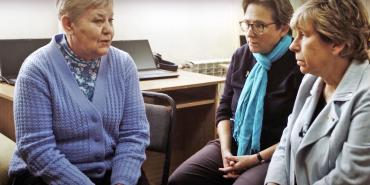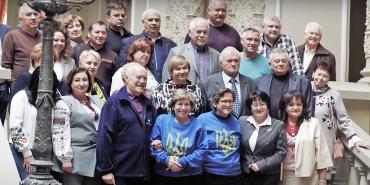The AFT has a proud history of defending democracy in Eastern Europe. Before World War II, our union began stepping in to save trade unionists from fascist and communist tyranny. The AFT was the most active trade union standing with the Solidarity movement in Poland during the 1980s. Now this work continues in Ukraine, where Russia has been waging a cruel war on civilians since February.
“We have a long history of showing up. Showing up for freedom, showing up for democracy, showing up for education, both here and abroad,” AFT President Randi Weingarten told MSNBC recently about why she led a delegation to Lviv, Ukraine, in October. Weingarten met with Ukrainian educators, trade unionists, medical workers and others who have suffered immensely during the war. Her visit was arranged by the AFT’s sister organization, the Ukrainian education union.
In a Dec. 8 webinar, Weingarten and the Albert Shanker Institute welcomed a teacher and a pediatrician to discuss our union’s most recent efforts to support Ukrainian students and teachers, and to share our drive to help Ukrainians survive this winter.
The webinar panelists were Alexandra Hernandez, a bilingual special education teacher and member of the United Federation of Teachers in New York City; Dr. Irwin Redlener, a pediatrician and public health activist with the Ukraine Children’s Action Project; and Weingarten. Shanker Institute Executive Director Mary Cathryn Ricker moderated the event.
Ricker opened the webinar with a gripping video from the visit to Lviv. Members of the AFT delegation listened as teachers described their firsthand experiences of destruction wrought by the Russian invasion. They heard in teachers’ voices the horror of losing their homes and loved ones. During the first months of the war, teachers even had to conduct classes in secret, under threat of torture and death for using the Ukrainian language.
The video shows a tiny bit of the terror Ukraine is going through, Weingarten said. She still has Lviv’s alarm system on her phone—it goes off five or six times a day, warning of incoming missiles and drone strikes. And the attacks are getting worse. Teachers try to create some kind of safe and welcoming environment for kids, she said, even as bomb shelters are pressed into service again as schools.
With Russian attacks intensifying at the onset of a frigid Eastern European winter, Weingarten and the mayor of Lviv discussed the need for portable generators. Early in the webinar, Weingarten announced that the AFT would collect donations to fund generators. That’s where the AFT and the Ukraine Children’s Action Project come in. Together, they are trying to raise $150,000 to buy 100 to 200 generators. To contribute, make a donation to the AFT Disaster Relief Fund.
Despite the hardships facing Ukraine, hope and inspiration welled up in the determination of the Lviv educators to create a sense of normalcy for their students.
“We have heard you,” Weingarten told the teachers at the end of her visit. “We will not let you down.” She promised to convey to Americans what the delegation had seen and heard “because we understand that you are on the frontlines of democracy and freedom.”
Following the video, the webinar panelists described their work helping Ukrainians.
Hernandez painted a picture of summer schools the AFT sponsored in Poland for Ukrainian child refugees. Every morning, students and staff would join in a family-style breakfast that provided a bright start to their day. Then they gathered in the gym and the classroom, where they “checked in” with their emotions before proceeding with lessons in basic English. In addition to academics, the children engaged in music, art, exercise and outdoor exploration.
As a pediatrician and founder of the Ukraine Children’s Action Project to help traumatized kids in Poland who are displaced from Ukraine, Redlener recalled that the very same week the AFT visited Lviv this fall, Russia expanded its vicious campaign against civilians in eastern and southern Ukraine.
In the United States, he pointed out, students who face barriers to learning usually live in poverty, with bad asthma or other troubles that keep them up all night, causing them to sleep at their desks during the day.
That said, Ukrainian students are among the most resilient he’s ever seen. Millions are displaced—5 million of the nation’s 7 million children have fled their homes, he said, “running as fast and as far as they can to the West.”
It’s important that teachers not leave their posts—although many have their own children, said Redlener, whose mother was a teacher for six decades. He warned that long-term interruptions like COVID-19 and war make it increasingly difficult for children to make up lost ground, as does untreated psychological trauma. These two things, he said, are the most potent underminers of a child’s future.
Weingarten said that 250 Ukrainian schools have been destroyed and 2,400 damaged. In Russian-occupied areas, soldiers pilfered everything of value, including school laptops. Even so, she said, replacing these things will be easier than repairing broken souls.
In it for the long haul
Ukrainian President Volodymyr Zelenskyy has said it will require the equivalent of several trillion dollars to recover from the war. Redlener thinks it will take much more. And that doesn’t count the personal, social and educational rebuild. When will the war be over? he asked: “No time soon, I’m sorry to say.”
However long it takes, the AFT and the Shanker Institute will continue their efforts to promote and preserve democracy, with particular attention paid to education, to solidarity with workers and to democracy for all.
Weingarten, whose parents immigrated to America from Ukraine, said that in 2014, the AFT joined with Education International and the heads of the Polish, Lithuanian and other teachers unions to advocate even more forcefully against authoritarianism, particularly in former republics of the Soviet Union where trade unions were trying to escape authoritarian control.
Hearing about the AFT’s long history with democracy, unionism and education filled Hernandez with pride. “It’s important to show up for solidarity, for democracy,” she said. “We must show up.”
Read more about the AFT’s years of solidarity with Ukraine in this Shanker blog post. And contribute whatever you can toward buying generators for Ukraine through the AFT Disaster Relief Fund. Just click on the drop-down menu and choose Ukraine.
[Annette Licitra]


